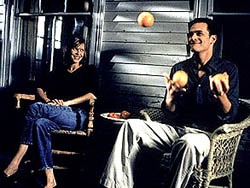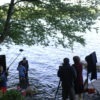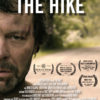
Return to Sender
Written by Kiersten Conner-Sax | Posted by: Anonymous
I clicked on the television the other morning to hear Ms. Gifford extolling the virtues of a movie without guns, without violence, in which the only time you heard a siren was when a father turned one on to amuse his children. Unfortunately, "The Love Letter" is also a movie without dramatic tension or an interesting plot.
That plot details the story of Helen MacFarquhar (Kate Capshaw), a divorcee in Loblolly-by-the-Sea, MA, who owns a bookstore into which no customer ever sets foot. In the words of one of her inexplicably numerous employees, Helen has been "emotionally celibate" for years, but when she finds an unaddressed love letter, she opens up to both a college student who works for her (Tom Everett Scott) and an old almost-love from high school (Tom Selleck). She spends the rest of the movie trying to decide between the two.
The problem is that we don’t really care whom she chooses. Her character is cold, humorless, and vacuous. It’s hard to see much difficulty in her situation: oh, my, how can she choose between the gorgeous young hardbody and the sensitive, aging hunk, each of whom hangs on her every word? Moreover, her anguish over her relationship with Scott’s character doesn’t make sense. Scott is fantastic here, amusing and edgy (and for once not playing a young Tom Hanks), yet Capshaw can’t seem to stand to be in a room with him unless they’re making out. Meanwhile, we’re all supposed to be drooling over Selleck, but the filmmakers fail to realize that his hunk days are over (at this point, he’s mostly doughy and creased), and he was never much of an actor to begin with.
This movie marks Capshaw’s return to film–her career went into remission when she became Mrs. Steven Spielberg, and, if nothing else, we should be grateful to the preeminent director of his generation for giving us a number of Capshaw-free years. It’s not that her performance is particularly bad, at first, but as the movie drags on, her self-absorption becomes more and more grating.
I found Loblolly-by-the-Sea grating as well. While the Gloucester, MA, location was quite scenic, the filmmakers stripped the town of its soul–for example, non-white people actually are allowed on the North Shore, but you won’t find any in this movie. It’s the "bucolic New England" that every Angeleno envisions after an earthquake or a mudslide. People still play records and leave their doors unlocked, and the most unusual thing you’ll come across is Ellen DeGeneres in a rain slicker.
The advertising for "The Love Letter" would have you believe that the film is a delightful farce. In fact, it’s neither; it’s hardly even a comedy. Perhaps we need a new genre for this kind of film, the kind in which a middle-aged woman (with an easily dispatched child) opens up to love due to an epistolary revelation and a drop-dead gorgeous guy. "Bad" is probably too general a name for this category.










